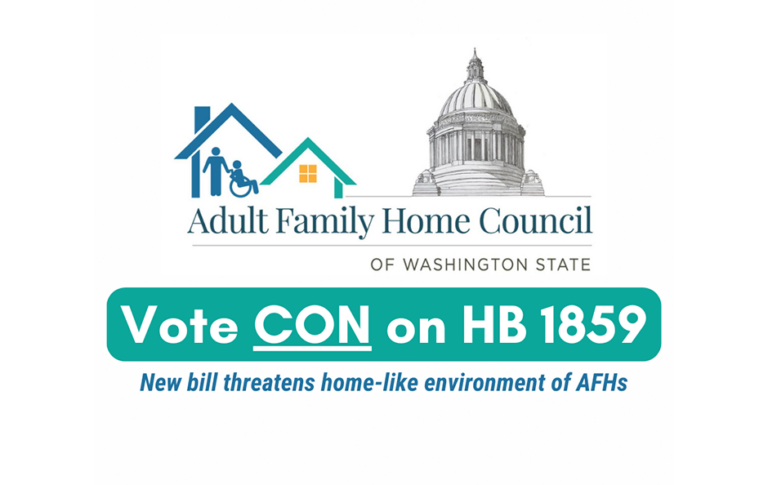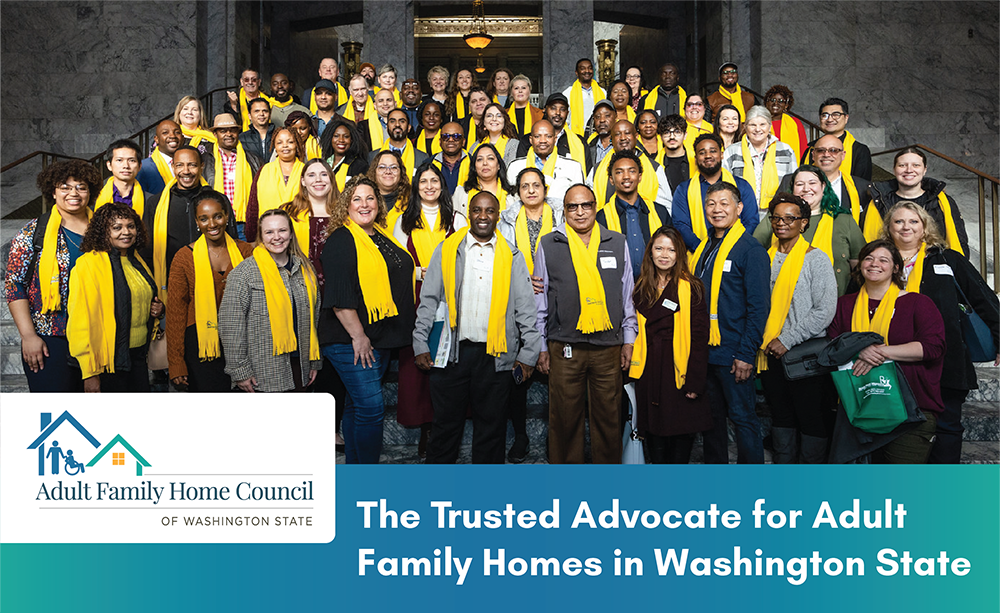
HB 1859 Threatens the Home-like Environment of AFHs
HB 1859 Threatens the Home-like Environment of AFHs
January 19, 2024 Update
Thank you all for being so engaged in voting! A total of 1,602 people voted CON on HB 1859 out of 2,795 votes. Unfortunately, the Council did not get the opportunity to testify during the hearing today. The hearing was suspended and moved to Tuesday, January 23, 2024, at 1:30pm. There will be a new link to watch the hearing and this means the voting was extended until 12:30pm that day.
If you haven’t yet voted CON on this bill, accidentally signed in pro, or want to express your support on this bill again, you can still vote! A new Member News post, linked in this update, provides additional details.
Dear Adult Family Home Providers,
House Bill 1859, titled “An Act Relating to the rights of residents in long-term care facilities,” seeks to apply federal regulations required for skilled nursing homes to long-term care facilities across the state, including adult family homes. The bill is scheduled for a hearing on Friday, January 19 at 8:00am in the Health Care and Wellness Committee. We are asking providers to vote against this bill by signing in CON, and share stories that the Council can retell at the legislature to highlight concerns about the bill’s potential impact on the home-like environment AFHs provide.
The AFH Council also hosted a legislative webinar on Friday, January 12, at 11:00am to discuss this bill and others that would have an impact on adult family homes. A recording of this webinar is linked below.
Vote CON on HB 1859
Share Your Story With Us
Watch Legislative Webinar
Please show your support against this bill by 7am on Friday, January 19.
More About HB 1859
HB 1859 would take ALL of the federal rules skilled nursing homes are required to follow and apply them to long-term care facilities in Washington State, including AFHs. Keep in mind that adult family homes are residential homes that provide an intimate, home-like setting for their residents. Most of the direct care workers in adult family homes are home care aides who might come in for weekday shifts, once a week, or provide care while living at the home as a live-in caregiver. Nursing homes, on the other hand, are large facilities with staffing similar to hospitals. They have mandatory 24/7 RNs, spend 3.4 hours per resident per day, and all of their aids are required to have certified nursing assistant credentials.
The following is a snapshot of some of the changes you can expect if HB 1859 were to pass. This is not an exhaustive list of all the federal rules your home will be expected to abide by:
- The facility must not require potential residents to be eligible for, or will not apply for, Medicare or Medicaid benefits. Facilities are required to accept all potential residents regardless of payment source.
- The facility must establish a resident council by designating a staff person to provide assistance and respond to written requests from group meetings.
- The facility must identify a Grievance Official who is responsible for overseeing the grievance process.
- The facility must provide access to electronic communications for email, video, and internet research.
HB 1859 Changes to Transfers and Discharges
Additionally, this bill would make significant changes to transfers and discharges. The following are some of the changes you can expect to see as a result of HB 1859:
- A resident has the right to appeal a transfer even if the facility is transferring them to a hospital to receive better care.
- The facility must provide a resident with a notice when transferring the resident.
- A facility cannot transfer or discharge a resident while an appeal is pending.
- A facility must allow a resident who appealed a discharge in a hospital to return.
- A facility cannot refuse a resident to return just based on the resident’s condition when originally transferred to the hospital.
- A resident has the right to appeal a non-payment discharge or any other transfer or discharge they see fit.
- A facility is still required to provide care while the appeal process is pending.

Share Your Stories to Support Testimony Against HB 1859
The AFH Council does NOT support HB 1859. We will be testifying against this bill on Friday, January 19, 2024, at 8:00am. In the meantime, we are asking all of you to share your stories of:
- Resident whose medical needs you could not meet, and the risks of having to care for that resident in your home.
- Behavioral health residents who have threatened or assaulted you, and/or your staff and refused to leave.
- Residents who you’ve had to go through extreme measures, including eviction, to have them removed from your home because of refusal to leave.
- Residents who have defaulted on their participation fee. What happened? What measures did you have to take to resolve this issue?
[gravityform id=”154″ title=”FALSE”]

